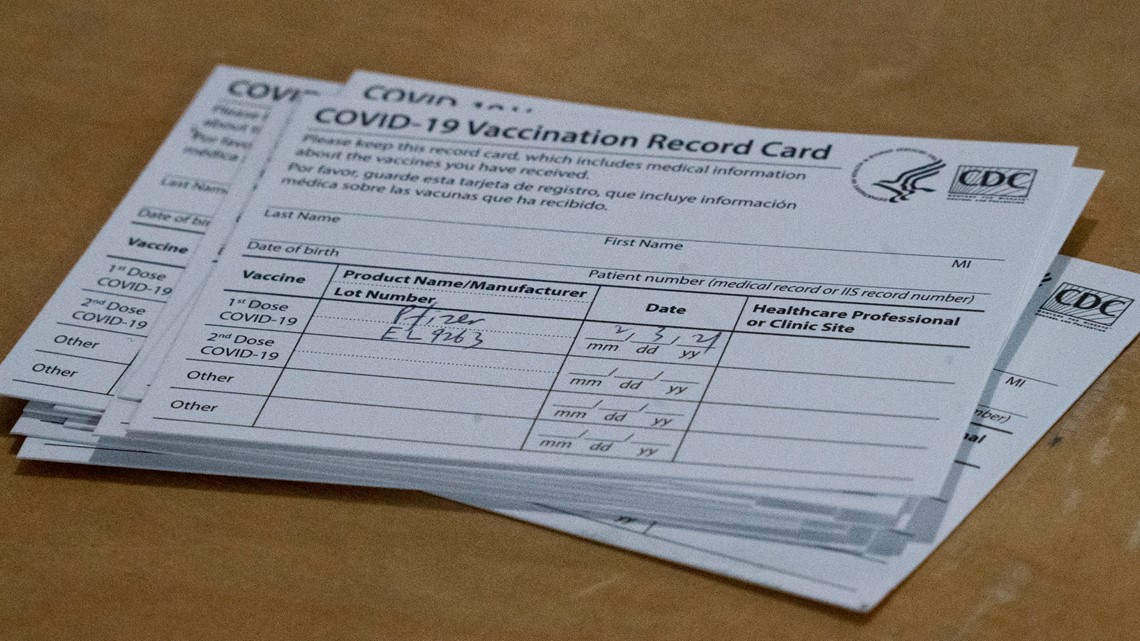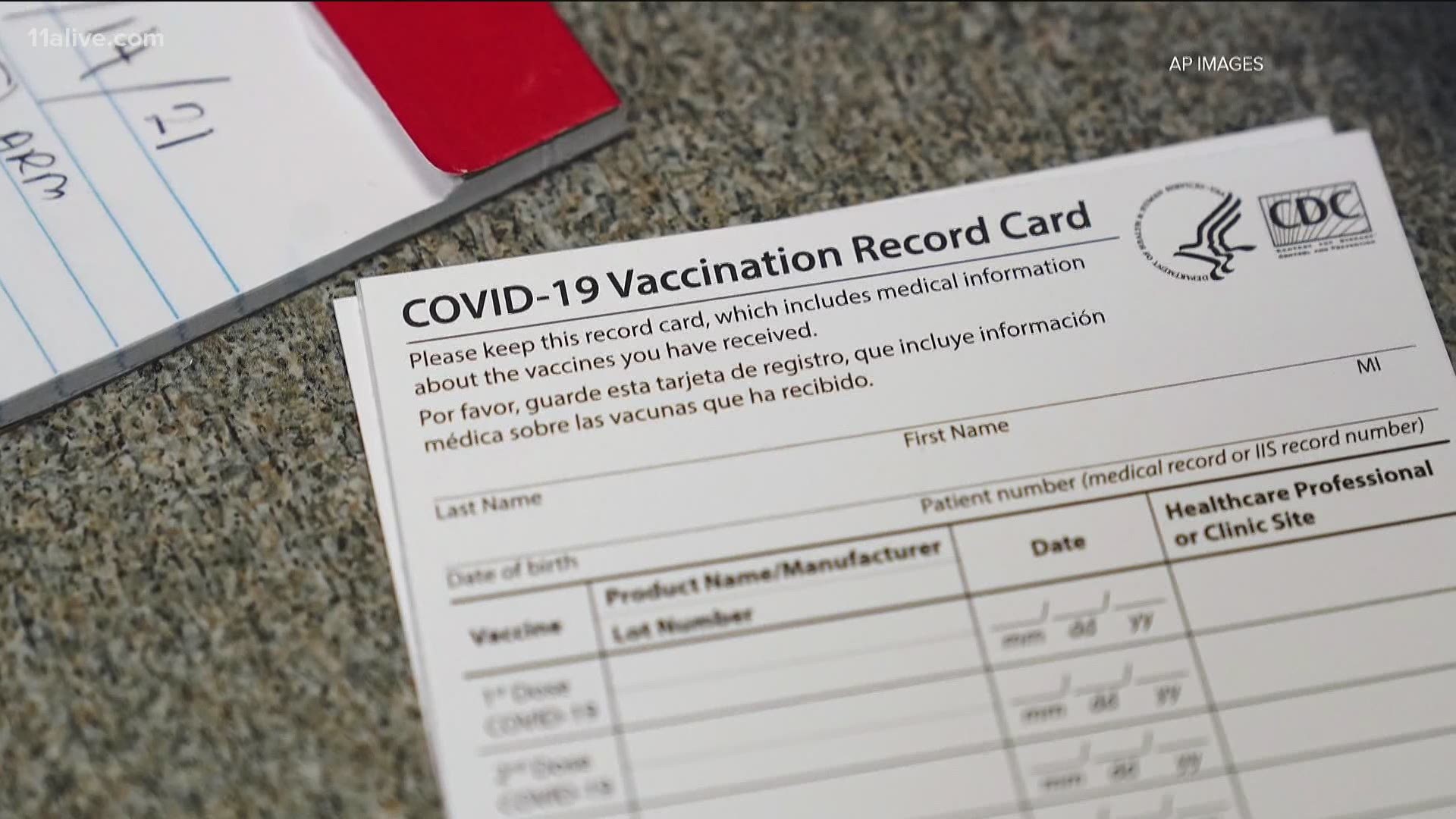WASHINGTON — In the United States, more than 100 million Americans have received at least one dose of a coronavirus vaccine, according to data collected by the Centers for Disease Control and Prevention.
So far, the U.S. Food and Drug Administration has given Emergency Use Authorization to the two-dose mRNA coronavirus vaccines from Pfizer and Modern, and a one-shot vaccine from Johnson & Johnson.
With each dose that is administered, the CDC and health providers give out 4-by-3-inch paper COVID-19 vaccine cards. In a post-pandemic world, these cards could help inoculated people more freely travel, shop and dine.
Below is everything you need to know about what you should and shouldn't do with a CDC-issued vaccination cards.
What is a vaccination card?
After someone's first coronavirus vaccine appointment, they should receive the 4-by-3-inch paper issued by the Centers for Disease Control and Prevention.
It helps keep a record of when and how many vaccine doses a person receives, where they received it and when the coronavirus vaccine dose(s) were administered.
The card also lists the patient's name and date of birth.
What happens if you lose it?
The CDC said if someone lost their vaccination card, or doesn't have a copy, they should contact their vaccination provider directly to get another.
If someone is unable to contact their vaccination provider directly, the CDC suggests they contact their state health department's immunization information system (IIS). Vaccination providers are required to report COVID-19 vaccinations to their IIS and other related systems.
Didn't get a card after your first vaccine appointment?
The CDC said if someone did not receive a COVID-19 vaccination card at their first appointment, they should contact the vaccination provider site where they got their first shot or their state health department to find out how they can get a card.
Keep the card somewhere safe
The CDC urges Americans to keep their cards in a safe place, just in case they are needed in the future. The health agency even encourages individuals to take a picture or make a photocopy of the card after the second dose appointment as a backup copy.
Do not post pictures of the card on social media
The FBI in February warned against sharing too much information with friends and family on social media related to the vaccine cards.
The agency asked Americans to not post photos of their CDC vaccine cards on social media because "bad actors can use these images to steal your identify and commit fraud."
The FBI said some run the risk of the vaccine card image "being widely shared if the privacy settings on your preferred social platforms are not strict."
Is there an online vaccine card?
Currently, there aren't any nationwide online vaccine cards, but there are resources available to those who have received the first vaccine dose of two.
Anyone who received their first dose of the coronavirus vaccine is welcome to enroll in V-Safe or VaxText. The CDC said these tools will help individuals access their vaccination information.
V-safe is a smartphone-based tool that uses text messaging and web surveys to provide personalized health check-ins after someone receives a COVID-19 vaccine. It can help inform the CDC if someone is having side effects from the shot and sends a reminder to get a second dose.
VaxText is a free text messaging resource that sends weekly text reminders to get a second dose of the COVID-19 vaccine, in English or Spanish. To enroll, vaccine recipients need to text ENROLL to 1-833-VaxText (829-8398) to get their weekly reminders.


Should the card be laminated?
The CDC currently doesn't have a standard on whether or not the COVID-19 vaccine card should be laminated or not. The only concern is that the card is completely up to date.
Emergency physician and public health professor at George Washington University, Dr. Leana Wen, told CNN that there's no problem laminating the card, as long as a backup card, or photocopy, has been made and both doses are listed on the card.
The potential for a booster COVID-19 vaccine is possible with the wide range of variants of the virus spreading across the globe. However, Dr. Maureen Miller, a professor of epidemiology at Columbia University's Mailman School of Public Health, told CBS News that there's no worry about laminating the card because by the "time a booster comes along, the technology will have evolved."
How to laminate vaccine card
Staples and Office Depot have announced customers can upgrade the durability of their vaccination cards with free lamination.
Office Depot said it will offer lamination services for vaccine cards for free through Saturday, July 25. Customers can visit Office Depot or OfficeMax store and provide coupon code "52516714" at checkout for the free service.
A spokesperson for Staples told CNN that the lamination service is available at all Staples locations in the U.S. and currently does not yet have an end date.
Is there a "vaccine passport?"
At this point in time, no, there aren't any universal vaccine passports. However, airlines and others in the travel industry are throwing their support behind it to boost pandemic-depressed travel. A handful of Republican governors have spoken out against COVID-19 vaccine passports and some have pursued proposals to ban their use.
Technology companies and travel-related trade groups are developing and testing various versions of the vaccine passports, also called health certificates or travel passes.
Vaccine passports are typically an app with a code that verifies whether someone has been vaccinated or recently tested negative for COVID-19. They are in use in Israel and under development in parts of Europe, seen as a way to safely help rebuild the pandemic-devastated travel industry.
If and when a universally accepted coronavirus vaccine passport will be available is still up in the air.
The Associated Press contributed to this report.

